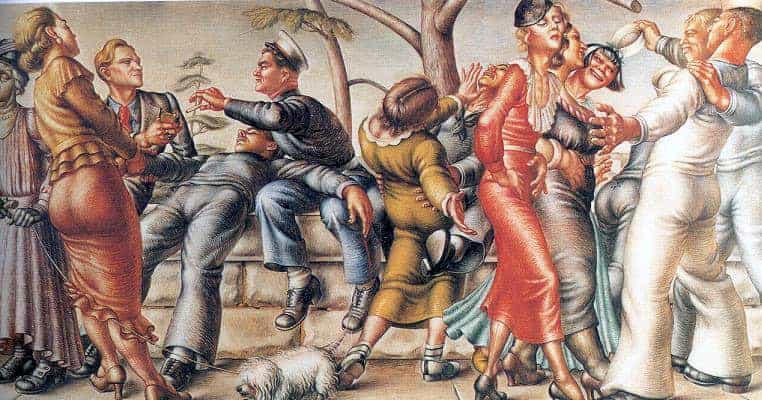Thomas Brunelle was recovering in a naval hospital in early 1919. As he waited to be discharged to rejoin his unit, he longed for the days, and nights, of excitement and adventure that he experienced at the Army and Navy Young Man’s Christian Association (YMCA) in Newport, Rhode Island. Another patient, Chief Machinist’s Mate, Ervin Arnold listened to Brunelle talk of the drag shows, dances, theatrics, and “degenerate” activities that happened with regularity at the YMCA.
Over the next several months, Brunelle’s conversation with Arnold would lead to a naval investigation, signed off on by a future president of the United States! The lead investigator was none other than Ervin Arnold, who sought to quash sexual encounters happening at the Y by personally recruiting enlisted men to operate as undercover investigators.
The Newport Sex Scandal was an investigation into illicit sexual behavior of Navy personnel. Over 15 men went through court martial proceedings for sexual encounters with undercover investigators. Linked to the investigation was the Assistant Secretary of the Navy and future President of the United States Franklin Delano Roosevelt. Below is the sensational but true story of the Newport Sex Scandal that unfolded between 1919 and 1921.

“It is Fun to Stay at the YMCA!”
Newport, Rhode Island had become a major port city by the mid-1700s. Situated at the lower section of Narragansett Bay, it was an important and ideal location for military installations. Wealthy industrialists had flocked to the waterfront land of Newport to build grand summer homes for their wives and children. When Army and Navy officers arrived, Newport’s elite civilian society welcomed them with open arms. The two hierarchies created a “mutual respect” for each other which resulted in considerable financial contributions to the comfort of enlisted soldiers and sailors.
One such philanthropic venture was the construction of a new YMCA building in 1911. The YMCA had been established in Newport since the late-19th century. Its building was small and outdated for the needs of traveling military personnel. A wealthy widow who summered in Newport from Ohio commissioned the construction of a new building that would be modern and have four stories “dedicated to the use and comfort of the enlisted men of the Army and Navy.”
The Army & Navy YMCA was designed with the young man in mind. There were approximately 114 residential rooms spread out over four floors. Each floor contained a lavatory and shower room. On the second floor was a library. On the first floor were reading and writing rooms, a social room, a billiards room, a main desk, sundries room, restaurant, and lunch counter. A large gymnasium provided a place to play basketball, hold dances and theatrical performances, and exercise on an elevated running track. The YMCA provided a “home-away-from-home” for hundreds of thousands of enlisted men that passed through Newport.

As war-ravaged Europe in 1914, President Woodrow Wilson debated with Congress for years about sending Americans into the fray. Finally, when Germany continued its unrestricted submarine warfare against passenger and merchant ships and when it seemed likely that Mexico would align with the Kaiser, President Wilson asked Congress to declare war in April 1917. Without a standing army, the United States began a massive mobilization of men and women to make “the world safe for democracy.” The first soldiers and sailors went to Europe in 1918.
This was the first time that the United States had mobilized so many men to fight a modern war overseas. Their behavior in Europe became a centralized focus of moral crusaders. These crusaders had advocated for decades that sex occurs only between a husband and his wife. They were successful in linking purity and virtue with being a good soldier and a good American. With the help of the US Military, the moral crusaders were successful in equating sexual pleasure with giving away military secrets to the enemy. Democracy would not be victorious if young soldiers were literally sleeping with the enemy.

